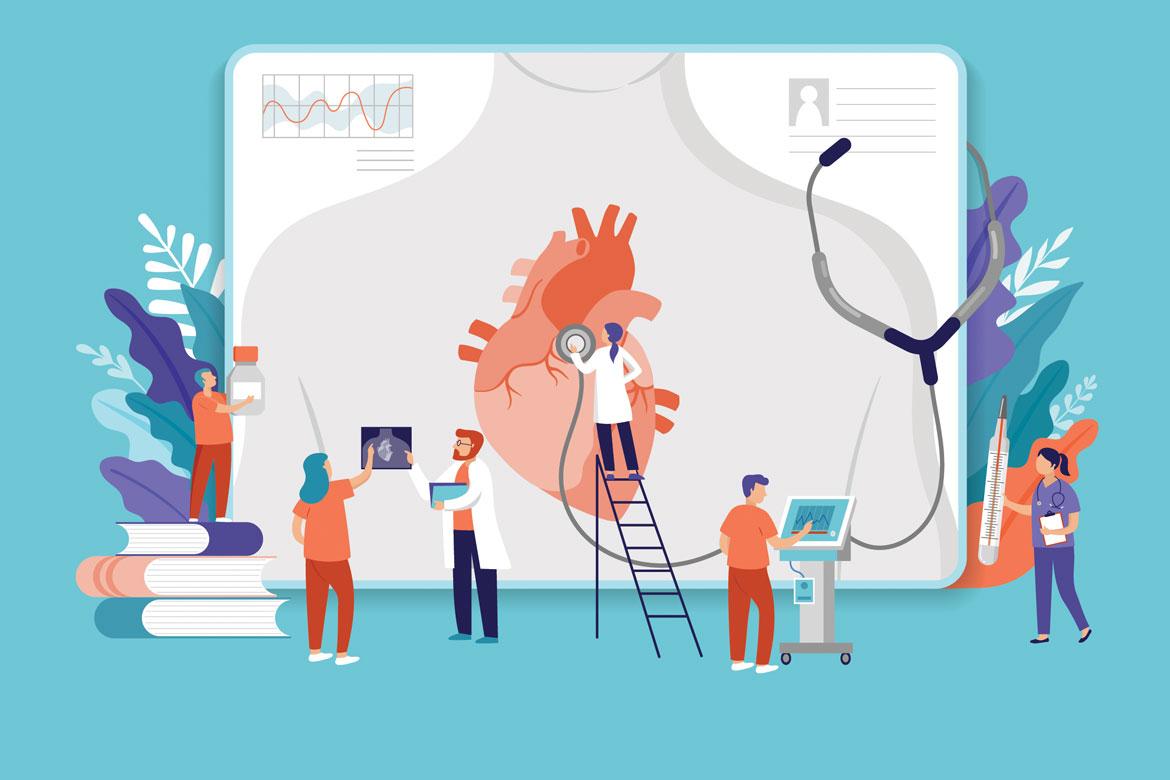-
-
Featured Care Areas

Heart Failure
How is heart failure diagnosed?
Your doctor will first conduct a physical examination and ask about your symptoms and medical history.
Diagnostic tests
Your doctor may recommend diagnostic tests to eliminate other possible conditions. Possible tests include:
- Chest X-ray to check for lung congestion or an enlarged heart.
- Blood test to identify various biomarkers that may indicate or eliminate certain health conditions. These biomarkers also monitor the function of other organs, such as your kidneys and liver.
- Stress test to check your heart rate, heart rhythm, breathing and blood pressure while you are walking or running on a treadmill. It will reveal your heart’s response to exercise, and whether blood supply in the arteries is sufficient.
- Electrocardiogram (ECG) to check your heart rhythm and detect arrhythmias. An ECG can also reveal a thickened left ventricle, enlarged heart chambers, or if you have had a heart attack before.
- Echocardiography, which is an ultrasound scan of your heart. It assesses the various structures and functions of the heart to check how well your heart pumps blood. It can also identify possible causes of heart failure.
- Myocardial perfusion scan, in which radionuclides are injected into your bloodstream. This reveals how well the heart’s chambers are working or whether a heart attack has damaged your heart.
- Cardiac catheterisation, in which a dye is injected using a small tube or catheter. This is followed by an X-ray to obtain pictures or angiograms to reveal any blockages in the coronary arteries.
- Magnetic resonance imaging (MRI) to reveal your heart’s structure such as its muscle, valves and chambers. An MRI will also show up any scarring (permanent damage) of the weakened heart muscle.
How is heart failure treated?
Your doctor may recommend a combination of lifestyle changes, medication and surgery to treat heart failure.
Lifestyle changes
To improve your heart health, your doctor may advise you to:
- Quit smoking
- Eat a healthy diet
- Consume less salt to reduce swelling
- Reduce or stop taking alcohol and other harmful drugs
- Exercise regularly
Medication
To improve your condition, your doctor may prescribe medication such as:
- Diuretics to help eliminate excess fluid in the tissues
- Vasodilators, angiotensin-converting enzyme (ACE) inhibitors, angiotensin II receptor blockers (ARBs) or beta-blockers to lower blood pressure and control heart rate
Surgery
Your doctor may recommend surgery to correct heart abnormalities causing your heart failure.
If you have end-stage heart failure, your doctor may recommend:
- Defibrillator. This is a pacemaker-like device that delivers an electrical shock to the heart in the event of a dangerous arrhythmia. Where suitable, your doctor may implant a special kind of defibrillator, called a cardiac resynchronisation therapy defibrillator (CRTD) to help your heart contract better.
- Ventricular assist device (VAD). This serves as a mechanical pump to support a weak heart. It may be an alternative for those with severe heart failure who are waiting to undergo a heart transplant or those who are not suitable for a heart transplant.
- Heart transplant. If you are not responding to other treatment options, your doctor may recommend a heart transplant from a suitable donor.
Make an appointment with our cardiologists for an accurate diagnosis to draw up your treatment plan.
This page has been reviewed by our medical content reviewers.
Need help?
For enquiries, please call
+65 6377 3737
For appointment bookings, please WhatsApp
+65 8111 3777




